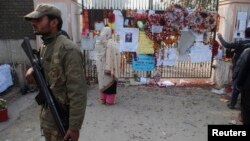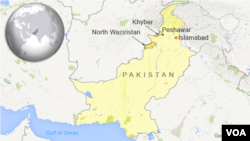Pakistani Prime Minister Nawaz Sharif has announced wide-ranging measures to counter religious extremism and terrorism in the country, a week after a Taliban assault on a school killed 150 people, almost all of them children.
The outlawed Taliban, waging an insurgency against the state, claimed responsibility for the December 16 attack on an army-run school in Peshawar. The bloodshed pained and outraged victims' families, and Pakistanis have since pressured the government to bring the perpetrators to justice.
The massacre of 134 children and 16 school staff prompted Sharif to reinstate the death penalty two days later. Authorities have since hanged six “hard-core terrorists” convicted on previous terrorism charges, and plans are in place to execute hundreds more.
Intensified attacks
Pakistan’s military has also intensified attacks against militant strongholds along the volatile border near Afghanistan.
On Wednesday, Sharif convened a meeting of leaders of all political parties and the military to broaden measures aimed at countering militancy in Pakistan. The conference lasted more than 10 hours, and the prime minister announced its outcome in a nationally televised speech after midnight.
Sharif said that “special trial courts are being set up under the supervision of military officers to swiftly prosecute terrorism cases and bring those responsible to justice.” He added that the courts would be in place for two years. In justifying the move, he acknowledged that “flaws in the legal system have helped criminals escape punishments in the past.”
The prime minister pledged that he would not allow militant groups and armed gangs to operate in Pakistan. He said the government had decided to move “effectively and with full force” against newspapers and magazines publishing literature that promotes violent extremism, sectarianism and intolerance.
Sharif promised that banned religious organizations would not be permitted to operate under new names, and he outlawed the promotion of terrorists as well as their ideology on Pakistani media. He went on to say that strict measures were being put in place to prevent terrorists from using the Internet and social media as propaganda tools.
Growing intolerance
The prime minister said steps were being taken to register and regularize religious schools, or madrassas, across the country. Critics blame these Islamic seminaries for growing intolerance in Pakistan.
Some critics feared that Pakistan’s latest countermilitancy drive would threaten human rights, but Ahmed Bilal Mehbood, who heads a nongovernmental organization that promotes democratic practices in Pakistan, dismissed those concerns.
"The conditions which we see in Pakistan today, especially after the incident in Peshawar, I think some extraordinary steps will have to be taken to combat this extremism," he said. "As long as we have democracy, as long as we have parliament, we have courts, I think it will not be possible to come up with laws which really are going to be violating our human rights and our human liberties.”
Human rights advocates have reacted with anger at Pakistan’s decision to end a ban on executions. Amnesty International termed it a "knee-jerk reaction which does not get at the heart of the problem," while Human Rights Watch said the government had chosen to indulge in "vengeful bloodlust."





